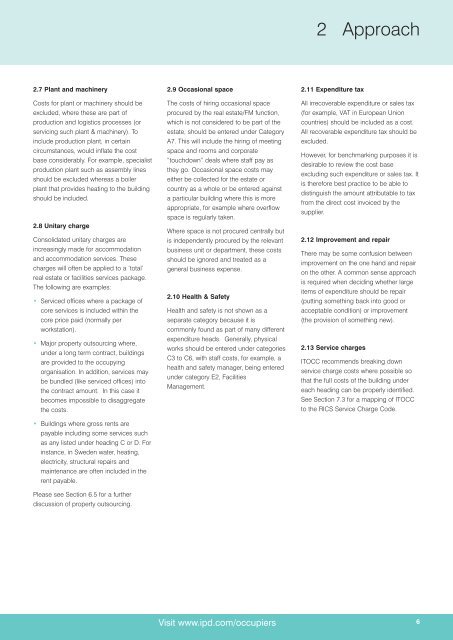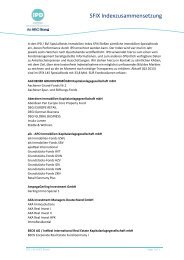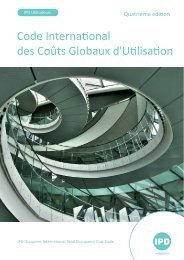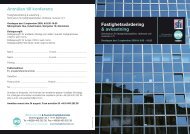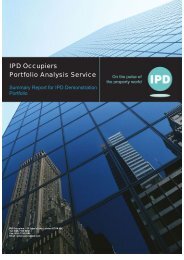International Total Occupancy Cost Code - IPD
International Total Occupancy Cost Code - IPD
International Total Occupancy Cost Code - IPD
Erfolgreiche ePaper selbst erstellen
Machen Sie aus Ihren PDF Publikationen ein blätterbares Flipbook mit unserer einzigartigen Google optimierten e-Paper Software.
2.7 Plant and machinery<br />
<strong>Cost</strong>s for plant or machinery should be<br />
excluded, where these are part of<br />
production and logistics processes (or<br />
servicing such plant & machinery). To<br />
include production plant, in certain<br />
circumstances, would inflate the cost<br />
base considerably. For example, specialist<br />
production plant such as assembly lines<br />
should be excluded whereas a boiler<br />
plant that provides heating to the building<br />
should be included.<br />
2.8 Unitary charge<br />
Consolidated unitary charges are<br />
increasingly made for accommodation<br />
and accommodation services. These<br />
charges will often be applied to a ‘total’<br />
real estate or facilities services package.<br />
The following are examples:<br />
• Serviced offices where a package of<br />
core services is included within the<br />
core price paid (normally per<br />
workstation).<br />
• Major property outsourcing where,<br />
under a long term contract, buildings<br />
are provided to the occupying<br />
organisation. In addition, services may<br />
be bundled (like serviced offices) into<br />
the contract amount. In this case it<br />
becomes impossible to disaggregate<br />
the costs.<br />
• Buildings where gross rents are<br />
payable including some services such<br />
as any listed under heading C or D. For<br />
instance, in Sweden water, heating,<br />
electricity, structural repairs and<br />
maintenance are often included in the<br />
rent payable.<br />
Please see Section 6.5 for a further<br />
discussion of property outsourcing.<br />
2.9 Occasional space<br />
The costs of hiring occasional space<br />
procured by the real estate/FM function,<br />
which is not considered to be part of the<br />
estate, should be entered under Category<br />
A7. This will include the hiring of meeting<br />
space and rooms and corporate<br />
“touchdown” deals where staff pay as<br />
they go. Occasional space costs may<br />
either be collected for the estate or<br />
country as a whole or be entered against<br />
a particular building where this is more<br />
appropriate, for example where overflow<br />
space is regularly taken.<br />
Where space is not procured centrally but<br />
is independently procured by the relevant<br />
business unit or department, these costs<br />
should be ignored and treated as a<br />
general business expense.<br />
2.10 Health & Safety<br />
Health and safety is not shown as a<br />
separate category because it is<br />
commonly found as part of many different<br />
expenditure heads. Generally, physical<br />
works should be entered under categories<br />
C3 to C6, with staff costs, for example, a<br />
health and safety manager, being entered<br />
under category E2, Facilities<br />
Management.<br />
Visit www.ipd.com/occupiers<br />
2 Approach<br />
2.11 Expenditure tax<br />
All irrecoverable expenditure or sales tax<br />
(for example, VAT in European Union<br />
countries) should be included as a cost.<br />
All recoverable expenditure tax should be<br />
excluded.<br />
However, for benchmarking purposes it is<br />
desirable to review the cost base<br />
excluding such expenditure or sales tax. It<br />
is therefore best practice to be able to<br />
distinguish the amount attributable to tax<br />
from the direct cost invoiced by the<br />
supplier.<br />
2.12 Improvement and repair<br />
There may be some confusion between<br />
improvement on the one hand and repair<br />
on the other. A common sense approach<br />
is required when deciding whether large<br />
items of expenditure should be repair<br />
(putting something back into good or<br />
acceptable condition) or improvement<br />
(the provision of something new).<br />
2.13 Service charges<br />
ITOCC recommends breaking down<br />
service charge costs where possible so<br />
that the full costs of the building under<br />
each heading can be properly identified.<br />
See Section 7.3 for a mapping of ITOCC<br />
to the RICS Service Charge <strong>Code</strong>.<br />
6


